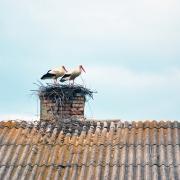What to Do If an Animal Gets in Your Chimney
Animals in chimneys can carry diseases that are dangerous for humans, including rabies. They also can cause a lung disease called histoplasmosis.
The first thing to do if an animal gets in your chimney is identify what type of animal it is. You can do this by listening to it chirp, squawk, flap, sniff, or claw.
Call a Professional
A wild animal trapped in your chimney can cause many problems. It can stink up your home, attract pests, and even spread disease. Additionally, it can leave feces behind, which can cause skin problems for people with sensitive skin.
It’s important to note that you should always call a professional to help with any chimney cleanup if an animal is stuck inside. This is because wildlife rescues have the proper credentials to deal with the animals and will be able to safely remove them from your chimney. It’s also illegal for homeowners to move wildlife without proper licenses and equipment.
You can usually tell whether an animal is stuck or chose to make your chimney their home on purpose based on the noises they are making. Stuck animals will make more frantic noises and scratch on the sides of the chimney as they try to get out. They will also usually scream if they are scared or feel their bodies being pulled against the wall of the chimney.
If you hear birds singing or chirping in your chimney, they are likely nesting there with their babies. It is best to wait for the baby animals to fledge before taking action. It’s also best to call a bird removal expert or wildlife control specialist. They can help you set no-kill traps in or around your chimney to catch the birds and return them to the wilderness.
Cover the Fireplace
If you think an animal is in your chimney and cannot get out, covering the fireplace can be a good way to keep it away from your home. This will prevent the animal from coming into your home and damaging your chimney, as well as preventing it from leaving feces, urine, and nesting debris behind inside your fireplace.
The best way to tell if an animal is stuck in your chimney is to listen for sounds. If you hear scuffling noises, or if the sound seems louder at certain times of day and night, this is usually a sign that an animal has made your chimney their new home. Animals that are stuck will also be frantic and make more noise as they try to escape.
Chimneys resemble caves, which attract animals looking for safe places to shelter from predators. Additionally, squirrels and birds often fall down chimneys when they are trying to evade predators or find new homes during winter.
If you can safely lower a rope down to the bottom of your chimney, you can help a trapped animal escape. A squirrel, for instance, can climb up a rope to the chimney damper, and then it will be able to open the damper and climb out of the fireplace. Be sure to cover the chimney with a protective covering or close your fireplace doors after you’ve lowered the rope down to ensure that the squirrel doesn’t climb back in.
Try to Get the Animal Out
It may seem like a good idea to run up onto the roof with some netting and try to get that animal out of the chimney yourself, but it’s not safe. It’s a good idea to call a professional for this kind of animal removal.
Instead, if the critter isn’t injured, you could lower a rope down into the chimney to help it escape. If you do this, be sure to have someone spotting you from the ground and that your ladder is sturdy enough to stand on. The animal might climb up the rope and return to its natural life in the wild.
If the animal doesn’t seem to be trying to escape, it might be making a nest or birthing its young inside the chimney. These animals can cause a lot of damage to the structure of the chimney and to the roof. They also may contaminate the living space with feces and urine, and they might leave droppings and other waste materials behind.
Another way to help keep critters out of your chimney is to install a top-sealing damper. This kind of damper has a rubber seal that prevents squirrels and other small animals from getting into the chimney. This is one of the best ways to keep raccoons and other larger animals from entering your home, too.






